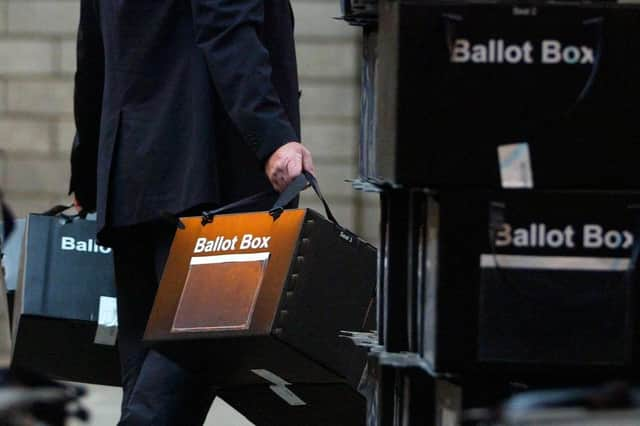Forget an independence referendum (it won’t happen) so what about the policies? – Brian Monteith


The Scottish economy is in dire straits yet few talk about it. As our public services struggle to cope with rising demand and falling standards Nicola Sturgeon and her fellow ministers would rather blether about holding a second referendum that even their own supporters do not consider an immediate priority. It distracts from her catastrophic failings – many outcomes are now the worst since devolution began twenty-two years ago – and it has until now helped keep her own supporters in check (lest they throw away their best chance of the ultimate victory).
Foolishly our opposition parties have obliged the First Minister by falling for the idea that preventing a referendum is the most important issue even though the Prime minister has ruled one out irrespective of the election result. Instead they believe the First Minister must be utterly discredited and forced to resign, an outcome for which there is little likelihood.
Advertisement
Hide AdAdvertisement
Hide AdEven if the First Minister is shown to have broken the Ministerial Code I expect her to dispute such judgements and attempt to brazen it out by inviting the public to endorse her. No doubt she shall plea for forgiveness for her political over-enthusiasm and use her management of the Covid pandemic to justify a second elected term.
Not her failure on education – despite her asking she be judged by it – nor any of her other many failings of which just one would have been enough to put the careers of Dewar, McLeish and McConnell in dire jeopardy.
For me the case for the First Minister’s departure was beyond dispute when she misled parliament about a ban on fracking that turned out – when it got to court – to not be a ban at all. If she would not resign then why would she resign now?
Beyond the issue of trust we must ask what about competence and economic competence in particular?
Have the Conservatives or Labour made the case for how they will improve health or education – and pay for improvements by restoring economic growth? Do voters know what the economic policies of these parties are – other than to rely on the British economy doing well and then taking more money from Westminster? Even Anas Sarwar is relying on Rishi Sunak!
Why not have policies that makes the Scottish economy the star turn in the UK, financial incentives that make British people want to live in Scotland before the rest of the UK?
By delivering higher economic growth we could have the resources to turn our schools and hospitals round to be the best in Britain. By working with the UK government rather than against it we could have better road infrastructure that, in this age of electric cars, could offer far quicker journey times, far greater productivity and ease the congestion and pollution.
Almost thirty years ago, in the US presidential election of 1992, James Carville coined the now ubiquitous phrase “It’s the economy, stupid” that helped propel Bill Clinton into the White House. As this Holyrood election approaches – what might well be the most important of those yet held – should we not be talking about “the economy, stupid”, rather than “the constitution, stupid”. How ridiculous, how conceited and self-indulgent, how Scottish, and, well, how stupid we are not.
Advertisement
Hide AdAdvertisement
Hide AdSo selfishly introspective, so self-absorbed and navel gazing has our political class become that in Scotland we would rather talk about constitutional diversions than what puts a meal on the table, gives our kids the ability to read, write and count properly and all of us the security of a health service that can cope with a coming tsunami of demand.
Meanwhile hundreds of millions are wasted on fripperies and false priorities to proclaim differences from our brethren – many of them fellow Scots in the rest of the UK – or duplicate services but with a Scottish flag on it – when nothing is spent on what binds us and benefits us from our solidarity.
These are the reasons this current government should go, not just the embarrassing and unforgiveable collapse of trust, unedifying though it undoubtedly is.
When the Conservatives and Labour cannot provide in the present any policy differences between themselves, never mind different policies from the past it should be no surprise another party steps forward to fill the vacuum. No wonder then Richard Tice’s Reform UK, built on the back of the Brexit Party, is offering a refreshing and truly liberal economic alternative to yet more big government. Crafted by Scottish economist Ewen Stewart, the raising of the income tax threshold to £20,000 and simplification of rates across a variety of personal and corporate taxes is designed to accelerate economic growth so we all see benefit – but especially the lowest paid. Next, Ewen Stewart will publish his verdict on the Scottish economy and what it needs to revitalise itself and provide the funds to save all those services the SNP has ravaged.
This coming election should not be about Nicola Sturgeon, it should be about how Scotland is turned around from a stumbling disaster to the model upon which the UK reforms.
Nicola Sturgeon is certainly not worthy of the name of First Minister, but thus far the opposition parties are hardly worthy of the name of opposition.
Brian Monteith is editor of ThinkScotland.org and served in the Scottish and European Parliaments for the Conservative and Brexit Parties respectively
Comments
Want to join the conversation? Please or to comment on this article.